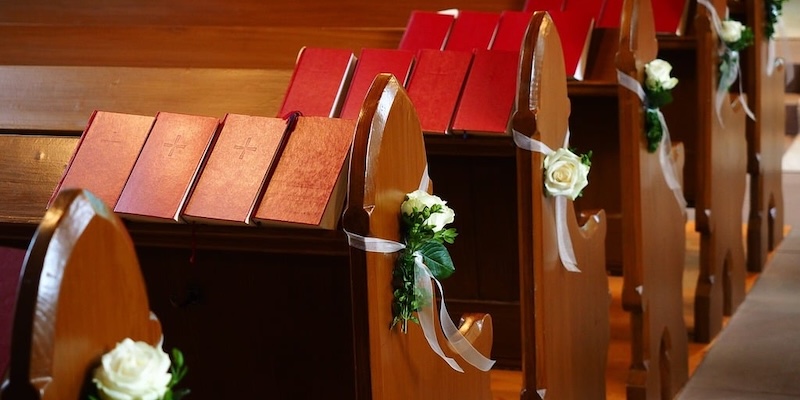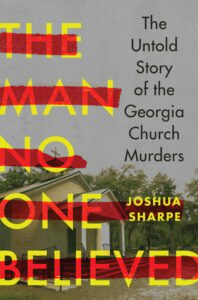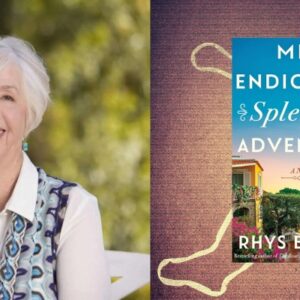A bare yellow bulb hung over the front door of a small church of white cinderblock. The moon waned. A young man walked across the grass toward the door.
It was a Monday night in March 1985, and twelve congregants were inside, studying their Bibles. In the front row, a burly deacon flipped the pages of his worn King James version. Sixty-six-year-old Harold Swain had grown up in this room. He’d been born in nearby Ware County, but when he was just a boy, he went to live on his grandparents’ farm in Camden County.
Swain grew up attending Rising Daughter Baptist and had led the Sunday school program for half his life. If Spring Bluff, a predominantly Black, unincorporated community of a few hundred people, had a mayor, it probably would have been Harold Swain.
Swain built his life on hard labor. For decades, he harvested pine trees to feed area mills, employing a small crew that included church members. Now he was mostly retired, but he was a church deacon and kept himself busy.
A lot of people knew him as the nice man who helped run Choo Choo BBQ, a local favorite for pulled pork, and the attached gas station. There was only one other store in Spring Bluff, Reed’s, and scarcely any other businesses. Neighbors had to look out for each other.
That night, the man climbing the steps to the front entrance, with the yellow light shining off his hair, wore dark clothing and cowboy boots.
Harold Swain was known as someone who would be there when there was a problem that needed solving. He’d stop by neighbors’ houses just to ask if they needed help in the yard. He was dependable, a protector.
That night, the man climbing the steps to the front entrance, with the yellow light shining off his hair, wore dark clothing and cowboy boots. He stepped inside and stood alone in the vestibule. The double doors to the sanctuary were closed. He leaned against the wall and waited.
The sanctuary was one long room with geometric stained glass windows, rows of dark wood pews, and white flowers flanking the altar. Congregants were holding a meeting of the church’s mission department, which included Bible study. Swain’s sixty-three-year-old wife, Thelma, was the secretary of the mission group. She sat at a table near the front, in her brown glasses and striped shirt, diligently taking notes.
Harold and Thelma Swain had been married for forty-three years. Thelma grew up not far from her husband on her family farm and had attended Rising Daughter Baptist all her life. After she married Harold, he started his logging business, and she took care of things at home. They were never far apart for too long, the type of couple that just fit.
She cooked breakfast for the two of them every morning, and at 6 p.m. she had dinner ready for whoever was there, which often included her nieces and sister, who lived down the road. The Swains adopted a grandniece who became their only child, and at various times over the years, the couple had taken in two of Thelma’s brothers.
Harold, who led Bible study for the mission group meeting, was the only man at the church that Monday night. Around him sat ten women—all of them homemakers and nurses—and one seven-year-old girl.
The group was made up of women from different churches in the area. They were: Vanzola Williams, Marjorie Moore, Lettie Frazier, Gwendolyn Owens and her seven-year-old daughter Leslie Owens, Vandora Baker, Mattie Owens, Louise Baker, Lottie Bell Clayton, Cora Fisher, and Thelma Swain. Most of them had known one another for much of their lives, and their children had grown up together in this sanctuary.
Vanzola Williams glanced at her watch and saw it was nearing 9 p.m.. Her daughter needed a ride home from work at K-Mart in Brunswick, the port city and largest town in the area.
Williams was fifty-five and soft-spoken, with a slight figure and thick-rimmed brown glasses. She raised her hand and said she had to leave, then said goodbye and placed her dues payment on the table in front of Thelma Swain.
When Williams pushed open the door to the vestibule, she found a white man who appeared to be in his twenties leaning there with his arms crossed, one scuffed cowboy boot on the floor, the other up on the front door. Startled, Williams jumped back a step. You want something? she asked.
I wanna talk to somebody, he said.
Who you want to talk to? Williams pushed the sanctuary door open so he could see inside.
He stuck his head through the door and craned his neck. That man there. He pointed to Harold, seated with Bible in hand.
In a broken world, Harold believed in that endless love.
Williams walked down the center aisle and touched Harold on the shoulder. Deacon Swain, there’s somebody want to see you.
Harold rose and laid the Bible down on his seat. It was turned to Ephesians, a book about a great mystery unraveled. In it, the apostle Paul writes of the revelation he’d received about the love of Christ, a boundless love that grants peace and eternal life, forever and ever. In a broken world, Harold believed in that endless love.
Harold approached the man. You want to talk to me?
Yes.
Harold tried to lead him outside, but the man said he wanted to talk right there in the vestibule. Vanzola Williams wasn’t worried—people often stopped by the church to ask for food or gas money. Poverty was deep and gnawing all over South Georgia. Helping people was core to the church’s purpose, and members didn’t turn away folks in need. Vanzola Williams left the two men to speak and went on to her car.
As Thelma Swain read aloud the last meeting’s minutes, she noticed everyone’s attention on the vestibule door, which Harold had left cracked. Y’all done got me nervous now, she said to the back of the women’s heads.
Thelma stopped reading at the sound of a commotion: loud thuds and shoes slapping on the floor. The women jumped up from their seats, and some ran to check on Harold. The two men were face-to-face, tangled up.
The stranger had a concealed handgun. He pulled it out and raised the weapon.
Harold kept fighting. The white man squeezed the trigger, cracking a shot through the air, then three more in quick succession. In an instant the women who’d been running to Harold’s aid were running for their lives, dashing toward the back exit.
Thelma was the only one who kept rushing forward, shouting, Harold is shot! When Thelma pushed open the door to the vestibule, Harold was slumped against the shooter, struggling and trying not to fall. The man had his arms around Harold, holding him up. The moment Thelma appeared, the gunman pointed the weapon at her and pulled the trigger.
Vanzola Williams had been about to climb in the car when the sound of gunshots snapped through the dark. She raced down the side of the church, running past the cemetery where the graves of loved ones and ancestors lay—Robinsons, Fraziers, Dallases. She heard a fourth gunshot. She pulled open the back door to the church and slipped inside. She hid in the kitchen.
In the sanctuary, two women were left. Cora Fisher had fainted and fallen between pews. The other, Marjorie Moore, was frozen where she stood, unsure which way to run until she rushed out a side door, through an anteroom, into the kitchen where there was a phone—but she couldn’t get it to work.
Moore, the hard-charging sixty-year-old president of the mission department, ran to the pastor’s study with his phone in mind. She found that nearly all the other women had beaten her there. Nobody called the police? she asked.
They’d tried. The phone was dead. Oh my God, Moore said.
The women prayed, then waited in pained silence for twenty minutes. They hoped Harold and Thelma were OK, but they had no idea if they were alive or dead because they hadn’t seen if either was hit by the bullets they heard. But if the Swains weren’t shot, where were they? Finally, Moore spoke up. Somebody has got to get out of here and go get some help.
But if the Swains weren’t shot, where were they?
He might still be out there, a voice said.
Moore decided to see for herself, with Lettie Frazier, sixty-two, following behind to make sure Moore was OK. They sneaked through the kitchen, out the back door, which opened to darkened woods by the graveyard. Moore walked slowly to the corner of the building and peeked around. She couldn’t see anyone.
As Moore crept back inside and returned to the other women in the pastor’s study, she realized that she was the only one who still had her purse. That meant Moore was the only one with car keys. Y’all pray I get to my car, she said, fishing them from her bag.
***


















